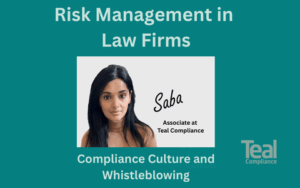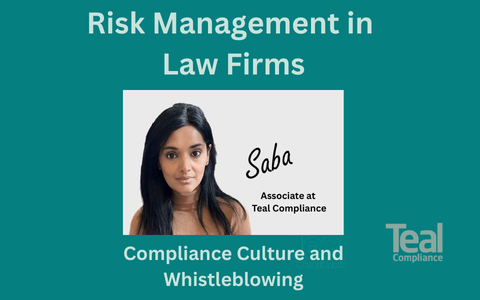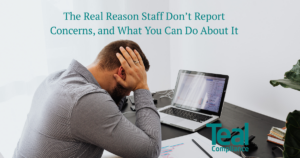By Saba Janjua, Associate at Teal Compliance, and specialist in AML and GDPR.
Why don’t staff speak up when something looks wrong? The answer often lies not in policies or training, but in a firm’s compliance culture, and how confident people feel about reporting concerns.
It may or may not surprise you that I’m asked this question from so many of our law firm clients:
“We have the right policies and training in place, so why don’t people speak up when something doesn’t look right?”
The Real Reason Staff Don’t Report Concerns and What You Can Do About It
The truth is, knowledge isn’t a barrier, fear is. Fear of being wrong, blamed, upsetting colleagues, or simply that nothing will change.
This is what I mean by compliance culture. You can have perfectly drafted policies, but if your culture doesn’t encourage open reporting, risks will be missed. And in areas like AML breaches or fraud, those gaps can be very costly.
Why Staff Stay Silent
From my experience, the barriers usually fall into three categories:
- Fear of reprisal – Worry about being labelled a “troublemaker,” especially in small teams.
- Lack of confidence – Uncertainty about whether an issue is real, leading to silence over embarrassment.
- Perceived futility – Belief that reporting won’t lead to action.
Why Culture Matters as Much as Policy
Regulators such as the SRA and Money Laundering Supervisors expect more than just write policies. They want proof that compliance works in practice, and that staff feel empowered to act.
If staff are silenced, risks remain hidden, resulting in missed red flags, increased fraud exposure, regulatory penalties for failing to report suspicious activity.
How Firms Can Build a Speak-Up Culture
Shifting culture takes time, but practical steps can make a big difference:
- Leadership tone: Partners and managers should show they welcome concerns, however small.
- Anonymous routes: Confidential channels reduce fear of backlash.
- Positive reinforcement: Thank staff who raise issues and show how it made a difference.
- Practical training: Use real scenarios or case studies so staff can recognise red flags and act with confidence.
Where Teal Compliance Can Help
At Teal, we understand how challenging cultural change can be, but it’s also the most effective way to strengthen AML and fraud prevention.
Our SORTED Programmes are designed to tackle the root causes of compliance failings, including cultural barriers, and deliver practical solutions.
For instant support, our Ask Teal service gives compliance officers and staff expert guidance when they need it most.
If you’d like to explore how we can help your firm build a genuine culture of compliance, get in touch at hello@tealcompliance
Thanks for reading and I hope this blog has been supportive.
Saba





